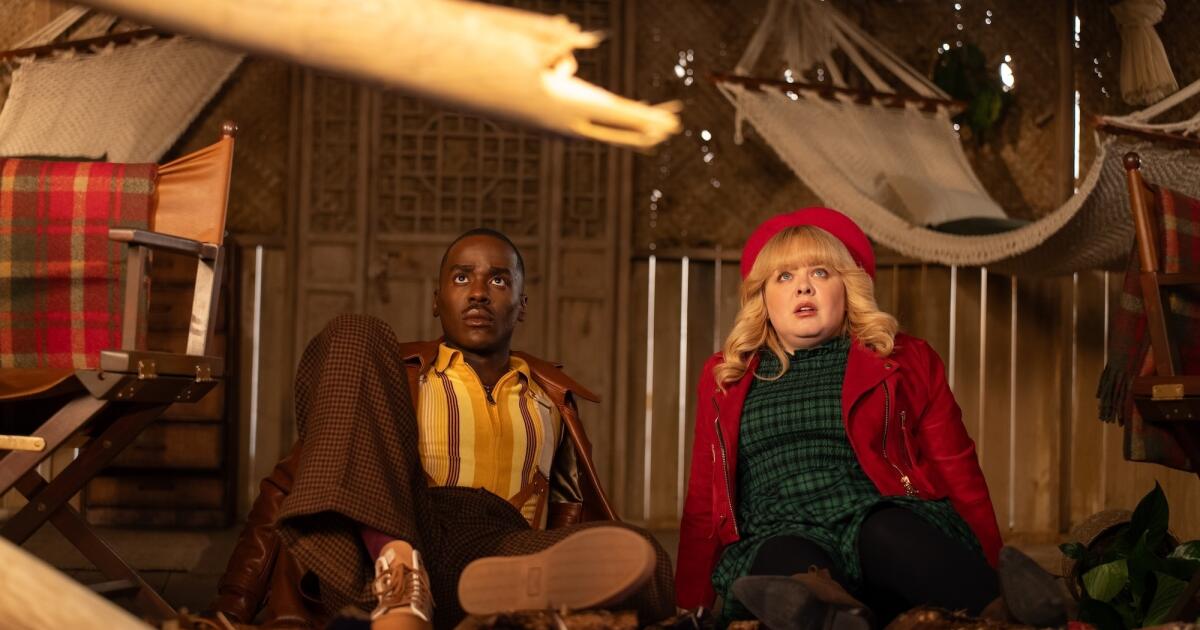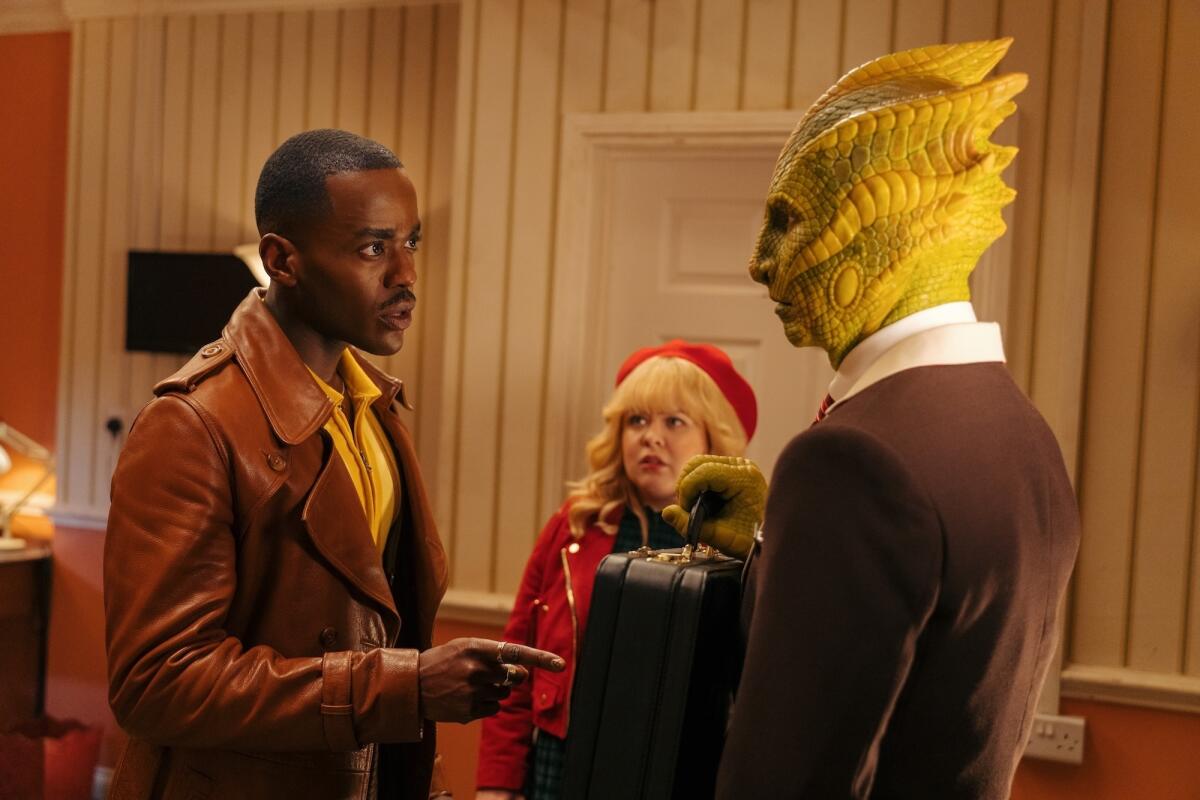World
Review: ‘Doctor Who Christmas Special: Joy to the World’ asks what is home?

On Christmas Day in Great Britain, after the presents have been unwrapped, the crackers cracked and the figgy pudding done away with, the people have traditionally turned to television, where major series air special episodes and the monarch addresses the nation (and commonwealth). “Television has made it possible for many of you to see me in your homes on Christmas Day,” said Queen Elizabeth II on that first broadcast in 1957. “My own family also gather ’round to watch television, as they are at this moment, and that is how I imagine you now.”
That speech was broadcast from Sandringham House, a royal residence in Norfolk, England. Perhaps not coincidentally, Sandringham is the name of a London hotel where much of the action of this year’s “Doctor Who” Christmas Day special, “Joy to the World” — coming to America on Disney+ — takes place. Not coincidentally, its main character is named Joy (Nicola Coughlan).
Holiday episodes have been a feature of the series since 2014, when “The Christmas Invasion” gave Tenth Doctor David Tennant his first full episode, just as “The Church on Ruby Road” did for Fifteenth Doctor Ncuti Gatwa in 2023. Though the special had moved to New Year’s Day for four years under third showrunner Chris Chibnall, Russell T Davies, who revived the show in 2005 and took back the reins in 2023, made Christmas Day specials a condition of his return: “This was kind of like No. 1 on my shopping list — Christmas Day. … Any story with tinsel in it is better than a story without tinsel in it.”
What is it about “Doctor Who” that has inspired us — that is, me, among other Times “Who” partisans — to cover every new Doctor since 2005, and every holiday special since “The Christmas Invasion”? Some mixture of helpless fanship and considered admiration, I reckon — the show is an encyclopedia of styles, anthologically diverse, offering drama, comedy, romance, suspense, alien strangeness and Earthly familiarity. Above all, over its many peaks and valleys, it is lovable, because it is full of love. Really, it’s the lovingest sci-fi franchise of them all. Thus has it embedded itself in the hearts of generations.
Trev (Joel Fry), a hotel employee, and The Doctor (Ncuti Gatwa) in “Doctor Who Christmas Special: Joy to the World.”
(Disney+)
Written by Steven Moffat, the series’ second showrunner and, along with Davies, the person most responsible for the shape of modern Whoville, the special begins with the Doctor hurtling through a cavalcade of times and places — a hotel room in 1940 Manchester, the Orient Express in 1962, Edmund Hillary‘s Everest base camp in 1953 — before arriving finally at Christmas Day 2024 and the aforementioned Sandringham Hotel, where Joy has just checked in. “Single?” asks Anita the desk clerk (Stephanie de Whalley). “Does it show?” replies Joy, misunderstanding.
In rapid due course, she will be joined by a Silurian (humanoid reptiles predating humans, which doesn’t matter here), wearing a business suit, with a briefcase chained to its wrist, announcing, “The star seed will bloom and the flesh will rise,” as the Doctor bursts in through a locked door and Anita comes in with towels. (Joy, upset: “Why is there a lizard man in my room?” Anita, unperturbed: “I’m so sorry, this has never happened before.”)
Cue the credits. When we return we’ve moved back in the chronology, but ahead in time, still in London, 2,000 years hence. Guided by a “nav-com algorithm that hones in on fresh milk” — the Doctor needs some for his coffee — the TARDIS lands in the lobby of the Time Hotel, which instead of rooms has portals to other times and places (no explanation necessary or given). The city has been completely taken over by the sharp glass skyscrapers already busy remaking its identity, but the staff and amenities of a luxury hotel are still in place — free coffee and newspapers (!) in the lobby, room service, a bar and fancy shops. There’s a Christmas tree. It’s true that the kitchen starts making your food 30 minutes before you order it, but, observes the Doctor, “It’s still microwaved.” “Well, you can’t expect miracles,” replies Trev (Joel Fry), the hotel employee he has roped into assisting him.
There are no alien enemies. There’s the Silurian (Jonathan Aris), but he just manages the hotel; the enemy, such as it is, is the briefcase, which attaches itself from host to host, taking them over in order to fulfill an agenda that will become more or less intelligible but in the end provides a Christmassy moment — which is, after all, what we’re here for. (Though I would not be surprised to find it informing the coming season.) Possibly it will make you cry, if you aren’t already. Many opportunities are provided.

The Doctor (Ncuti Gatwa), Joy (Nicola Couglan) and the hotel manager (Jonathan Aris), who isn’t an enemy — it’s the briefcase.
(Disney+)
The author of several previous Christmas “Who” episodes, Moffat is good at puzzles and illogical logic, like an M.C. Escher of scenario writing. To be sure, any time-travel story will be full of contradictions. (The Time Hotel, the doctor declares, is “paradox-proof,” handing you a peg from which to suspend your disbelief.) It’s difficult, perhaps impossible, probably pointless to tie all the ends together, to understand how the circuitry works — certainly not as you’re watching, while things move fast and explanations, when given, are not necessarily intelligible. (“When you explain things, do people feel any better?” asks Joy. “Not usually, no,” replies the Doctor.) It’s the way a magician works, in the spaces of your inattention. Of course, magic isn’t for everyone.
Like every Doctor — there have been 14 actors officially in the regenerating role, not counting some extras who have slipped in since 1963, and with Tennant going twice — Gatwa is the one and only Doctor while he’s playing the part. All Whovians should agree — not that all Whovians agree on anything — that it fits him like an intelligent glove (see: “The Church on Ruby Road”), even as he’s shaped it to his exuberant self.
There are four hotels in this episode (two are merely passed through), reflecting in a looking-glass way the series’ long interest in home. The Doctor has none, being a refugee from the planet Gallifrey, which in any case has been destroyed (maybe, sort of, it’s complicated) and is not his actual home, as he was abandoned there as a foundling. Numerous companions have left theirs to travel with him and left him in turn. “You and me,” says hotelier Anita, “letting people get on with their lives.” (De Whalley is a highlight of the episode for me.)
“Do you know how alone you are?” the Doctor accuses himself (literally). “You live in a great big giant spaceship and there aren’t any chairs and you haven’t even noticed because nobody ever comes ’round.” But just as a TARDIS is just a spaceship, so a rented room, with chairs, may also become homey with the right people in it, and time — another interest of the series, obviously — to get acquainted.
That is your Christmas message. May it serve you well.








